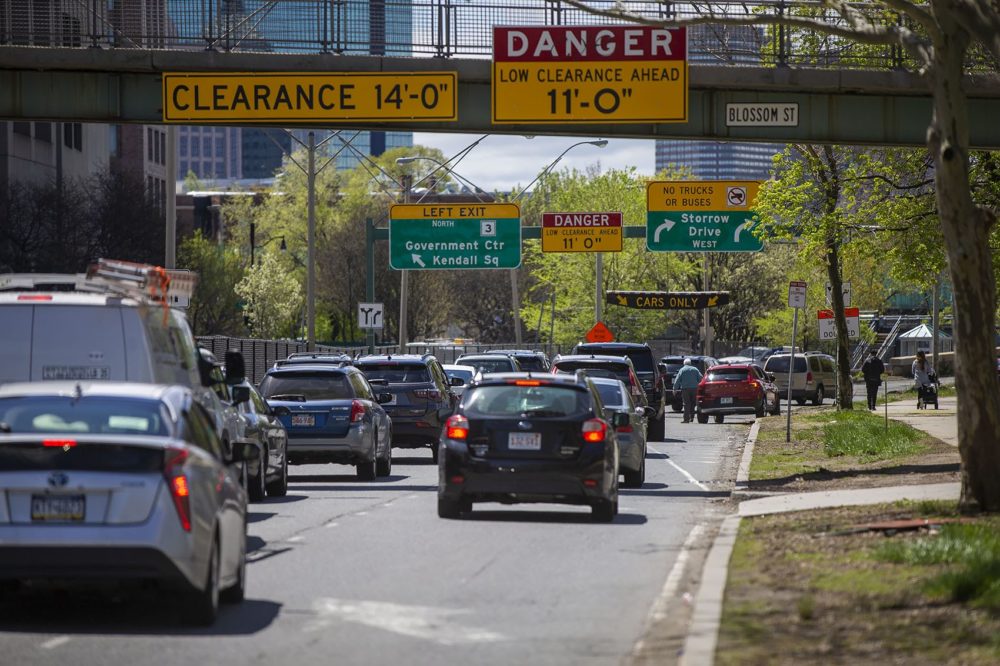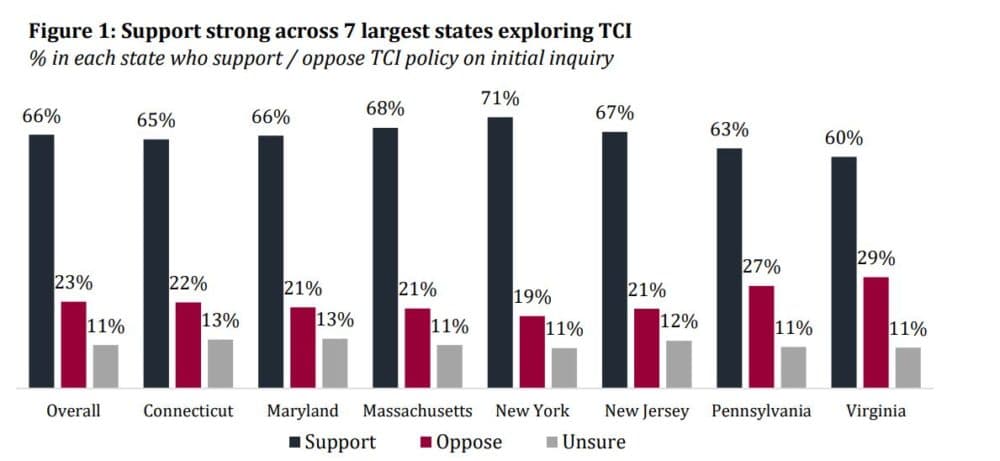Advertisement
Poll: Voters Back Compact To Reduce Transportation Emissions

Voters in seven of the states participating in a nascent program to reduce transportation emissions, including Massachusetts, largely support the effort, according to a new poll.
A MassINC poll published Wednesday found that a majority of registered voters in Massachusetts, Connecticut, Maryland, New York, New Jersey, Pennsylvania and Virginia strongly or somewhat support their home state's participation in the Transportation and Climate Initiative.
In Massachusetts, 68% of the 629 respondents said they support the program, compared to 21% who oppose it and 11% who are unsure, according to the poll, which was sponsored by the Barr Foundation.

Only New York voters, with 71% support and 19% opposition, were more in favor among those polled.
Pollsters reached nearly 6,400 voters across the states. Every state saw at least 30% net approval for the program, often referred to as TCI, when pollsters asked if voters would support requiring gasoline and diesel companies to pay for the pollution they create and using the proceeds to improve transportation.
"This is a complex policy, and so we took the time to explain the basics of how it would work and how states might use the funds generated by it," MassINC Polling Group President Steve Koczela said in a press release. "Support was broad, stretching across demographic and party lines and throughout the region."
Twelve states — the seven targeted in the poll plus Delaware, Maine, New Hampshire, Rhode Island and Vermont — and the District of Columbia are negotiating the framework for TCI, which will be a mandatory cap-and-invest system similar to the Regional Greenhouse Gas Initiative.
Once implemented, fuel suppliers will need to purchase carbon allowances to account for the emissions created by their products. Early estimates indicate the caps could generate $150 million to $500 million in revenue for Massachusetts, which could then be directed toward transportation projects.
Bay State voters were the most enthusiastic among those surveyed about using that new funding to improve existing public transit: 86% strongly supported that use, a higher rate than any of the other six states, according to the poll.
The second-most popular spending plan among Massachusetts voters was a tie, with 82% strongly supporting both protecting existing infrastructure from the effects of climate change and making public transit more affordable to encourage greater ridership.
State leaders plan to unveil proposed emissions caps for TCI by the end of the month.
Although the final TCI terms are still in development, it is likely that consumer costs at the gas pump will increase. The poll's question did not reference the potential of higher costs on motorists when asking about their support for the program.
Gov. Charlie Baker, Transportation Secretary Stephanie Pollack and Energy and Environmental Affairs Secretary Katie Theoharides plan to discuss TCI at a Wednesday event hosted by environmental and business groups.
The National Federation of Independent Business and the Massachusetts Fiscal Alliance, the latter of which has previously criticized the process for drafting TCI, are also planning a Wednesday press conference to announce their opposition to the multi-state initiative. Both groups said state lawmakers would join them.
NFIB argues the costs of the caps will "ultimately be passed on to small businesses, consumers and commuters at the gas pump as a hidden fuel tax."
"Small businesses require fuel to transport goods and provide services. Many have fleets and employees use vehicles to get to job sites or a client’s location," the organization wrote. "This new tax will impact more than just small businesses and their workforce. It also means when operating costs for businesses increase, the prices of goods and services will go up for every Massachusetts consumer."